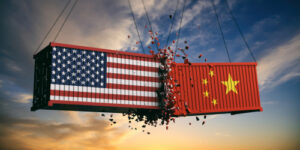Understanding Tariffs: The Hidden Costs for Consumers and the Economy

In recent discussions around economic policy, tariffs have emerged as a controversial topic, especially with proposals to increase them dramatically on international imports, particularly from China. Here at Extreme Investor Network, we believe it’s essential to unpack the ramifications of these tariffs — not just for the economy but for everyday consumers who ultimately bear the brunt of these financial decisions.
The Proposed Tax Increase on Imports
Former President Donald Trump’s administration proposed raising tariffs on certain Chinese goods from 60% to 100%. Additionally, a universal tariff ranging from 10% to 20% on all international imports was suggested. While the intention may be to create a level playing field for American manufacturers, the truth is, these tariffs act as a tax upon the American consumer.
Who Really Pays the Price?
Philip Daniele, CEO of AutoZone, succinctly stated, “If we get tariffs, we will pass those tariff costs back to the consumer.” It’s no longer a question of if businesses will raise prices, but when. Numerous companies, including retail giants and manufacturers, have openly expressed their intention to transfer these added costs straight to the consumer’s wallet. Rising prices are already a concern; the last thing consumers want is increased expenditures on goods when they are still reeling from the effects of inflation.
Walmart’s CFO, John David Rainey, voiced a similar apprehension, indicating that increased tariffs could exacerbate the financial burdens felt by U.S. households. Add to that Lowe’s CFO, Brandon Sink, who highlighted that about 40% of their costs derive from overseas sourcing. These sentiments reflect a consensus across industries: tariffs come at a cost, and it’s the consumer who will pay the price.
A Tax on All Americans
According to a study by the National Retail Federation (NRF), the proposed tariffs could result in a staggering annual cost of between $46 billion to $78 billion for American consumers, translating to an extra $362 to $624 per household each year. Low-income Americans, who often rely on affordable products sourced from China, will disproportionately feel the impact. Increases in prices for necessities like apparel, footwear, and household appliances could wreak havoc on family budgets.
Jonathan Gold, NRF’s Vice President of Supply Chain and Customs Policy, emphasized the reality of tariffs: “A tariff is a tax paid by the U.S. importer, not a foreign country or the exporter. This tax ultimately comes out of consumers’ pockets through higher prices.” It’s a glaring reminder of how policy decisions can trickle down to affect the average American family’s finances.
The Bigger Picture: Manufacturing and Global Trade
While Trump advocated for tariffs as a means to restore American manufacturing, the approach may be shortsighted. High tariffs could unintentionally push companies to seek alternatives, including moving supply chains out of the United States entirely. This would not only undermine the goal of job creation but further entrench reliance on global supply chains.
Furthermore, retaliation from other countries, particularly China, could impact American agricultural products. As we have already witnessed, China is capable of precision-targeted economic retaliation, affecting critical U.S. exports.
Acknowledging Historical Context
Looking back at history, the economic strategy known as mercantilism — simulating trade through tariffs and barriers — has rarely yielded long-term success. Trade should be about mutual benefit, and the loss of free trade can promote discord rather than economic stability. Just as the Roman Empire thrived for over a millennium with an ethos of free trade, we must seek cooperative economic policies rather than divisive barriers.
Conclusion: The Path Forward
At Extreme Investor Network, we advocate for policies that foster growth without penalizing consumers. High tariffs are not just a tax on goods; they represent a broader economic strategy fraught with risk. Navigating the landscape requires understanding the underlying economic principles and the potential consequences on our daily lives.
In short, while boosting American manufacturing is an admirable goal, the solution should not come at the expense of consumers who ultimately drive the economy. It’s time to consider more innovative and constructive pathways to strengthen our economy and improve the lives of all Americans.

